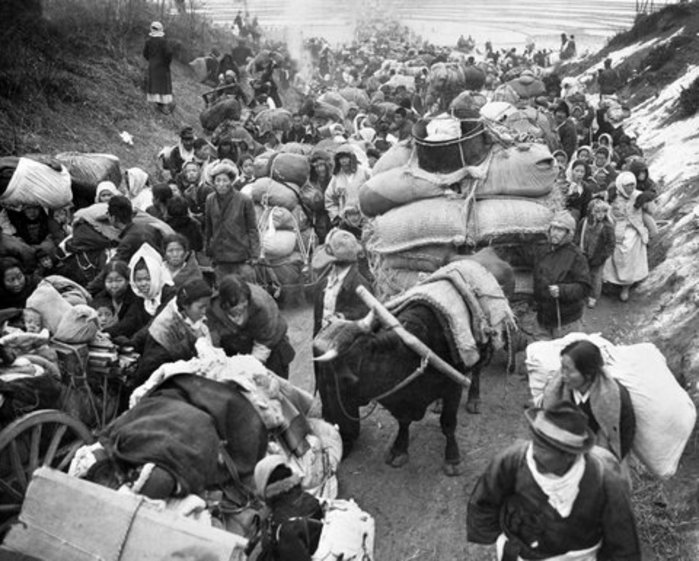71 years ago, the Korean War ravaged the Korean peninsula as the Democratic People’s Republic of Korea (North Korea) and the Republic of Korea (South Korea) fought for control in a conflict that would cost the lives of 2.5 million people. Similar to the war in Vietnam, the Korean War was a proxy war that pitted western forces like the US and UK against communist forces from the Soviet Union and China. North Korea, supplied with weapons and communist ideals from the Soviet Union, invaded the South. In an effort to stop the spread of communism, the United Nations, led mainly by the US, joined the war and sent troops to back the South Koreans.
The result of this war in the largely undeveloped Korea was a nightmare for the millions of innocent civilians who suffered from North Korean atrocities. Despite the Korean War’s major role in the Cold War, the catastrophic events that took place throughout Korea remain generally unknown. However, survivors who fled from Korea as a result of the war still suffer from its effects today.
One such survivor, my grandmother and a member of the Cherry Hill community, Mrs. Yoon Kang, 77, experienced the horrors of the Korean War firsthand as she, along with members of her family, attempted to escape the North Korean invasion. Recently, I interviewed her, and she detailed some of the captivating stories that have still stuck with her to this day.
At the time, Mrs. Kang resided in the small town of Kunsan in the Jeollabuk-do region of South Korea. When the Korean War began, she was only three years old and lived in an area with many of her relatives and extended family. Her father, a banker, was the town’s leader of the South Korean resistance against North Korea, and her grandfather, the small town’s mayor, was extremely anti-communist.
As leaders of South Korean opposition to the North Korean regime, Mrs. Kang’s father and grandfather immediately became targets of the North Korean soldiers, who would try multiple times to capture or kill them. To evade capture, Mrs. Kang’s family would often have to hide in the nearby mountains or seek refuge in relatives’ homes. However, North Korean soldiers eventually caught the family at their home, taking Mrs. Kang’s father to the local police station and nearly torturing him to death. Although he healed from this incident, the near-death experience made the North Korean invasion a harsh reality for Mrs. Kang’s family.
As the Korean War advanced, bombing raids on South Korean towns became more frequent, and Mrs. Kang’s family would often have to hide in an underground shelter in the surrounding bamboo forest. In one incident, her father had been hiding in a relative’s house, but shortly after he left to return home, disaster struck. “He was a couple of blocks out from that house, and the North Koreans bombed it,” Mrs. Kang said. “Everybody died but my dad lived.” However, it wouldn’t be the last time Mrs. Kang’s family suffered from North Korean oppression.
Soon after, her grandfather’s brother’s family was caught and taken to a nearby mountain for execution. “[The North Koreans] would tie everyone together and push one of them off a cliff.” Mrs. Kang said. “A lot of people from my town died this way.” Fortunately, her relatives would survive, as a North Korean servant of the family told the North Korean soldiers that he would execute them himself, leading the soldiers to leave. The servant let the family go, even helping them return safely to their home.
Although her relatives were lucky enough to have some North Korean sympathizers, there were also a number of South Koreans who openly supported the North Korean regime. One such supporter, the teacher of Mrs. Kang’s older sister, came to her house once, inquiring about the location of her mother. Fearing capture and potentially even death, her mother hid in a pile of fire tinder, hoping that the teacher would not search the house. Mrs. Kang’s sister, who was in sixth grade at the time, opened the door to the teacher, who threatened to kill her if she lied or said she didn’t know where her mother was. Mrs. Kang recalled, “My sister said, ‘If I die it’s ok, but if I live my mother will die, so kill me.’” The teacher hit her on the head and left without finding her mother.
Shortly after, Mrs. Kang and her family left their town and escaped the conflict of the Korean War. Years later, she and her new husband immigrated to America to live with her husband’s brother and start a new life.
Exactly 71 years ago, on July 27, 1953, North and South Korea signed the Korean Armistice Agreement, officially ending the Korean war and setting up a demilitarized zone between the two countries. Although the fighting ceased, tensions between the North and South continued to escalate for decades after, especially as a result of North Korea’s nuclear program. Millions across the Korean peninsula were separated from their families in the chaos, leaving many unsure of whether or not their loved ones had survived. Despite the existence of information online and in history textbooks, survivors like Mrs. Kang are some of the few remaining links to the past. It’s essential to hear survivors’ stories to discover the true extent of war’s effects beyond just the soldiers on either side. As those who lived to experience history’s tragedies begin to pass, the responsibility to retain their stories falls to the next generations, not just to honor them, but to honor all who were affected by the hardships of the past.


